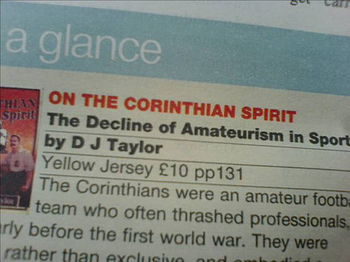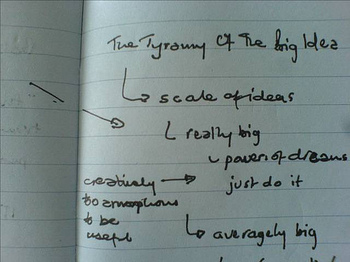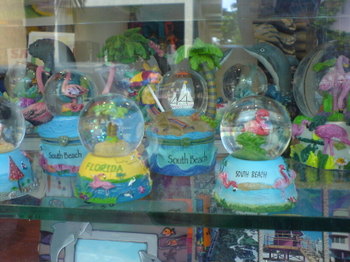I've been thinking a bit about PDAs and phones recently. And I had a really interesting chat the other day with Iain who was enthusing about his new k800i and explaining how he'd starting using his phone to photograph contact details off his computer screen before going to a meeting, rather than printing stuff off, or writing it down. This really made sense to me. And I realised that I've been doing something similar. I've been keeping lots of notes on my phone - I've been recording the records and books I want to buy by photographing them and sending them to flickr. And then they're there whenever I want them. The only slightly awkward bit of this process is the sending to flickr, which takes a few clicks. I would love there to be a 'send to flickr' button.
And, recently, I've started writing stuff down in my notebook and shooting it with my camera. Things like shopping lists like the one above. Because pen and paper seems to aid the editing process. I can't buy everything I think I might want to buy and the shopping list is the first filter. Of course, you could argue that I should just take my notebook with me everywhere I go. And I kind of do. But there's always some occasions when you forget it, but I virtually never forget my phone.
Anyway, I'm seeing this as emergent behaviour in my life - is it happening in yours? The reason I think it works is because it harnasses quite a lot of natural behaviour:
Pressing a shutter and shooting something is easy and natural - it's a quick way to capture a bit of information. Especially information like this.
The folksonomic quality of flickr (and it's permanence) you don't have to trawl back through old notebooks is a good way of keeping/archiving stuff. And the pictures help you sort and remember the information - you get this extra information from the visuals than you would from some ordinary database.
And it's becoming clear to me that scribbling a note with pen and paper, then photographing it, is a better way of 'digitising' information than scratching away with a stylus or trying to txt anything diagramatic or whatever. I wonder if phone/PDA design is going to start addressing this way of using them. Or maybe I'm a freak.










